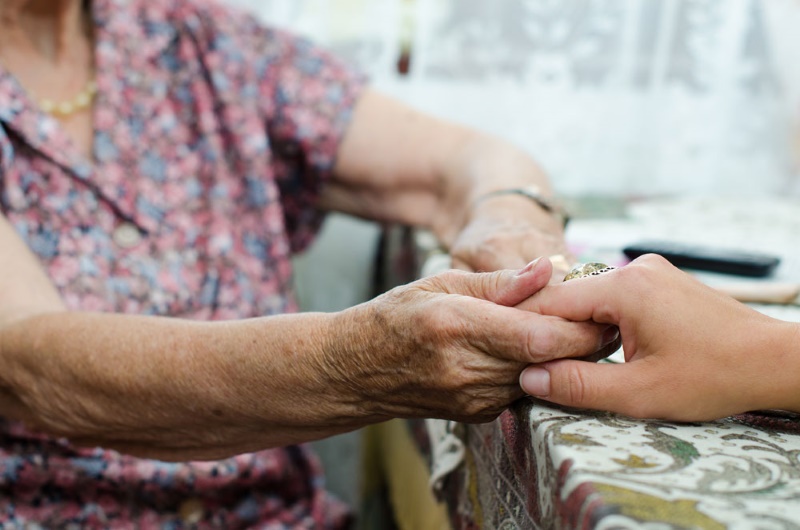Getting support with bereavement and loss
Updated: 10 Apr 2024
The ways in which bereavement, and other losses, affect us are very personal and members often tell us they have joined the Society to make new friends after losing a partner.

It is natural for the impact of a close bereavement to cause feelings of loss and grief. However, similar feelings can also arise if a loved one develops dementia, or moves to live in a care home.
Bereavement and loss are complex experiences so everyone deals with them differently, and there is no set time it will take to feel more like yourself. At first, thoughts and feelings can be chaotic and overwhelming and it might be difficult to explain them. Common feelings include shock, a feeling of disconnect, anxiety, anger, irritation, guilt and intense sadness. Some people feel the need to be ‘strong’ and hold their emotions back.
With that in mind, it can be hard to know how to respond when a friend or family member is grieving. We may feel the need to ‘make things better’ or fear saying the ‘wrong thing’. So, in this guide we consider some of the ways in which members can be supported to cope with bereavement and loss.
Psychotherapist, author and founder of the charity Child Bereavement UK, Julia Samuel MBE, has written about the following ways in which family and friends can help, in her book and on her website, both called ‘Grief Works’ (https://griefworks.co.uk).
- Listening – by giving your time to listen and acknowledge the extent of someone’s loss, you allow them to be upset and confused. By telling their story, the weight of their loss can slowly become easier to bear.
- It’s not about you – it’s easy to confuse our own need to talk with what another person needs so let the mourner lead you, rather than directing them how to respond. Some people may not want to talk about their loss right now.
- Acknowledgement – bereaved people sometimes see fear in the faces of friends and family who don’t know what to say, or not say, and end up saying nothing. So take the initiative to make contact, show kindness and acknowledgement of their situation and then follow their lead on when they want to see or speak to you.
- Practical help – people often bring food or do some shopping after the first few days, but think about how you can help once that initial crisis is over.
- Honesty – it can be comforting for a bereaved person to deal with honesty, when faced with their own complex emotions. It’s best to be honest about what support you can realistically offer such as visiting once a week for half an hour.
- Be sensitive – always balance honesty with sensitivity, so when you are talking about what is going on in your own life, bear in mind how that could make the bereaved person feel.
- Be in for the long haul – try to stay in contact when other people have drawn back. Often around three months after a bereavement, friends and family understandably get back to their own lives. By you popping round or having a chat on the phone, the bereaved person can still receive your support.
- Writing – letters, cards, emails and texts with a warm, personal message which acknowledges their loss can really help the bereaved person. Even if you didn’t write at the time, a card sometime later can be helpful, letting them know that they and their loved one have not been forgotten.
Practical steps
There are things that a bereaved person can do for themselves, or be encouraged to do, which can help them through the grieving process. These include:
- Getting plenty of sleep
- Eating healthily
- Being kind to yourself and avoid pressure to feel better quickly
- Avoiding numbing the pain of grief with alcohol or other substances
- Trying to keep to a routine and return to activities you enjoy such as swimming, listening to music or reading a book, even if you do a bit less than usual
- Finding small things that make you feel better, like buying yourself flowers
- Speaking to your GP or a bereavement support organisation if you feel it is having a permanent impact on your life and how you feel.
Useful links:
Cruse Bereavement Care – support, advice and information for bereaved people (call 0808 808 1677 or visit www.cruse.org.uk).
Samaritans – 24-hour helpline, to talk to someone about anything that’s troubling you (call 116 123, or visit www.samaritans.org)
The Silver Line – a free, confidential 24-hour helpline specifically for older people (call 0800 470 80 90 or visit www.thesilverline.org.uk)
The Compassionate Friends – support for people who have suffered the death of a child at any age. Their helpline is staffed by bereaved parents (call 0345 123 2304 or visit www.tcf.org.uk).
Child Bereavement UK – support for families when a child of any age dies or when a child is facing bereavement (call 0800 02 888 40 or visit www.childbereavementuk.org).
To find out more about the advice, care and welfare support you receive as an Oddfellows member, please visit our Member Benefits section.
DISCLAIMER: Links to third-party sites do not constitute an endorsement by the Oddfellows and use of the advertised products and services is entirely at your risk. The Oddfellows does not accept any liability or responsibility for any third party material on other websites.
